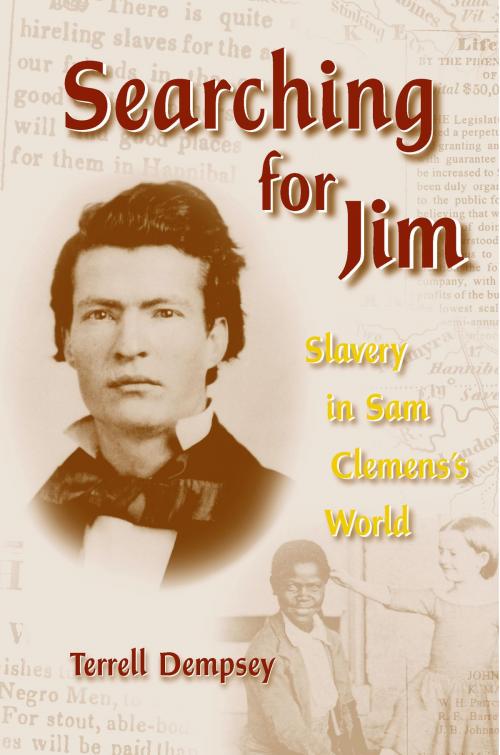Searching for Jim
Slavery in Sam Clemens's World
Fiction & Literature, Literary Theory & Criticism, American| Author: | Terrell Dempsey | ISBN: | 9780826264398 |
| Publisher: | University of Missouri Press | Publication: | March 27, 2014 |
| Imprint: | University of Missouri | Language: | English |
| Author: | Terrell Dempsey |
| ISBN: | 9780826264398 |
| Publisher: | University of Missouri Press |
| Publication: | March 27, 2014 |
| Imprint: | University of Missouri |
| Language: | English |
Searching for Jim is the untold story of Sam Clemens and the world of slavery that produced him. Despite Clemens’s remarks to the contrary in his autobiography, slavery was very much a part of his life. Dempsey has uncovered a wealth of newspaper accounts and archival material revealing that Clemens’s life, from the ages of twelve to seventeen, was intertwined with the lives of the slaves around him.
During Sam’s earliest years, his father, John Marshall Clemens, had significant interaction with slaves. Newly discovered court records show the senior Clemens in his role as justice of the peace in Hannibal enforcing the slave ordinances. With the death of his father, young Sam was apprenticed to learn the printing and newspaper trade. It was in the newspaper that slaves were bought and sold, masters sought runaways, and life insurance was sold on slaves. Stories the young apprentice typeset helped Clemens learn to write in black dialect, a skill he would use throughout his writing, most notably in Huckleberry Finn.
Missourians at that time feared abolitionists across the border in Illinois and Iowa. Slave owners suspected every traveling salesman, itinerant preacher, or immigrant of being an abolition agent sent to steal slaves. This was the world in which Sam Clemens grew up. Dempsey also discusses the stories of Hannibal’s slaves: their treatment, condition, and escapes. He uncovers new information about the Underground Railroad, particularly about the role free blacks played in northeast Missouri.
Carefully reconstructed from letters, newspaper articles, sermons, speeches, books, and court records, Searching for Jim offers a new perspective on Clemens’s writings, especially regarding his use of race in the portrayal of individual characters, their attitudes, and worldviews. This fascinating volume will be valuable to anyone trying to measure the extent to which Clemens transcended the slave culture he lived in during his formative years and the struggles he later faced in dealing with race and guilt. It will forever alter the way we view Sam Clemens, Hannibal, and Mark Twain.
Searching for Jim is the untold story of Sam Clemens and the world of slavery that produced him. Despite Clemens’s remarks to the contrary in his autobiography, slavery was very much a part of his life. Dempsey has uncovered a wealth of newspaper accounts and archival material revealing that Clemens’s life, from the ages of twelve to seventeen, was intertwined with the lives of the slaves around him.
During Sam’s earliest years, his father, John Marshall Clemens, had significant interaction with slaves. Newly discovered court records show the senior Clemens in his role as justice of the peace in Hannibal enforcing the slave ordinances. With the death of his father, young Sam was apprenticed to learn the printing and newspaper trade. It was in the newspaper that slaves were bought and sold, masters sought runaways, and life insurance was sold on slaves. Stories the young apprentice typeset helped Clemens learn to write in black dialect, a skill he would use throughout his writing, most notably in Huckleberry Finn.
Missourians at that time feared abolitionists across the border in Illinois and Iowa. Slave owners suspected every traveling salesman, itinerant preacher, or immigrant of being an abolition agent sent to steal slaves. This was the world in which Sam Clemens grew up. Dempsey also discusses the stories of Hannibal’s slaves: their treatment, condition, and escapes. He uncovers new information about the Underground Railroad, particularly about the role free blacks played in northeast Missouri.
Carefully reconstructed from letters, newspaper articles, sermons, speeches, books, and court records, Searching for Jim offers a new perspective on Clemens’s writings, especially regarding his use of race in the portrayal of individual characters, their attitudes, and worldviews. This fascinating volume will be valuable to anyone trying to measure the extent to which Clemens transcended the slave culture he lived in during his formative years and the struggles he later faced in dealing with race and guilt. It will forever alter the way we view Sam Clemens, Hannibal, and Mark Twain.















